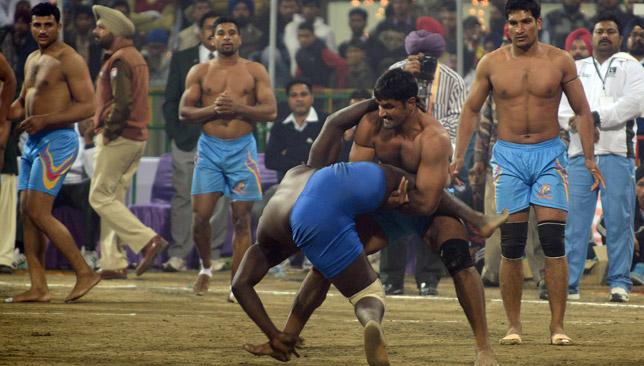
Kabaddi – referred to as ‘the game of masses’ – is yet to be recognised as an Olympic sport despite its rising popularity. On Saturday, the fifth edition of the Kabaddi World Cup took place, with India once again crowned world champions – albeit in a controversial manner.
India, hosts of the tournament, trailed against arch-rivals Pakistan for three quarters of the final, but eventually won 45-42 to claim their fifth straight title. Pakistan launched an official protest against some perceived biased decisions and threatened to boycott the event in next editions if it is held in India.
Before we go on, you may be wondering, what exactly is Kabaddi?
The national sport of Bangladesh and Nepal, Kabaddi is played as four- or seven-a-side depending on the variation and sees a ‘raider’ attempt to touch opposition team players in order to gain a point, while defenders try to catch the raider in order to snatch the point for their own team. Participants require characteristics associated with both rugby and wrestling. Offence is an individual effort, whereas defence is a group effort.
It is probably one of the oldest games on the Indian sub-continent, dating back to some 4000 years and was created to develop self-defence; tales of Kabaddi are found in Indian epic Mahabharata, which describes a battle between the warrior Abhimanyu – the heir of the Pandava Kings – with the Cauravas inside the enemy camp.
However, it has evolved dramatically from its roots and in last few years has been played as an indoor sport as well on EVA foam mats. There are three major styles – Traditional, Beach Kabaddi and Circle Kabaddi – with the game particularly popular in India, Nepal, Pakistan, Bangladesh, Japan, Sri Lanka, Thailand, Malaysia, Iran, Korea, Argentina, Canada, U.K, Italy, China, Trinidad and Tobago, and Australia, while it is attracting other nations.
The Circle Kabaddi World Cup has been played since 2010 on an annual basis and India have been the dominant force. But in the last two years, Pakistan has started to threaten their supremacy and have finished runners-up four times, while Canada came second in 2011.

The India-Pakistan rivalry is, as always, a sensitive topic. In this weekend’s edition of the Kabbadi World Cup, Pakistan claimed that the buzzer went too early in the fourth quarter – when India was in a winning position – and also suggested the referees sided with the host nation.
“We will not participate in the World Cup next year if it will be held in India with such refereeing standards,” angry Pakistan skipper Shafiq Ahmed Chishti told Sport360. “India hosting the World Cup doesn’t mean they shouldn’t allow any other nation to win it.
“There was a clear bias as the buzzer went off much early than the original time in the fourth quarter, while our players were not allowed to drink water in between. We led comfortably for 75 percent of the match but several key decisions were given against us in the dying moments.”
India did not dismiss Pakistan’s claims out of hand, instead asking the losing finalists not to leave for home as they have sent the matter to the technical committee, which has been tasked with making the decision whether there was any unfair play involved on the part of referees or players.
Putting aside the controversy, the future of Kabaddi appears positive as several lucrative and high-profile leagues have started, including the first Pro Kabaddi League – built on a similar pattern of cricket’s Indian Premier League (IPL), and is played as an indoor sport.
As many as eight franchises took part in the first edition of the event in 2010 with players from across the world participating. It was won by the Jaipur Pink Panthers, owned by famous Bollywood actor Abhishek Bachchan.
In addition, there is a World Kabaddi League (WKL) played across four different continents as an outdoor sport that sees the top teams from different countries participate, like football’s Champions League.
“The future of Kabaddi is really bright as several high-profile tournaments and leagues are now being regularly staged,” Pakistan Kabaddi Federation secretary Muhammad Sarwar said. “The game and its athletes evolve as a better product when there is financial security which is now only improving with a passage of time.
“I’m sure that Kabaddi will become a worldwide sport soon because of its popularity and appeal to the public. Hopefully, it will be soon be inducted as an Olympic sport as well.”

The sport’s first big break came in the 1936 Berlin Olympics, when it was officially recognised during a demonstration match. It was then included as a demonstration game in the ninth Asian Games, hosted by India in 1982.
Kabaddi was then inducted as a regular sports discipline in the 1984 South Asian Games played in Dhaka, Bangladesh, and also included as a regular sports discipline during the 11th Asian Games held in the year 1990 in Beijing, China.
The World Kabaddi Federation (WKF) is working hard to get game into the Olympics, but they have been told by the International Olympic Committee (IOC) that their request could only be entertained if the game can be played systematically in 50 affiliated countries.
Recorded Coverage | Final’s & Closing Ceremony | 5th @KabaddiWorldCup Punjab 2014 – YouTube http://t.co/FmCGupSJpw
— Kabaddi World Cup (@KabaddiWorldCup) December 21, 2014
It would be interesting to see whether Kabaddi would be given a berth at the Olympics or not in coming editions of the event, but a bigger challenge for the participating nations and the world governing body of the game is to eradicate bias and foul-play.
Before asking the IOC for a fair chance at the biggest games of all, Kabaddi needs to clean up and ensure fair play for participating nations; cries of cheating, continued complaints and protests will only weaken the sport’s hopes of forcing its way into the Olympics.